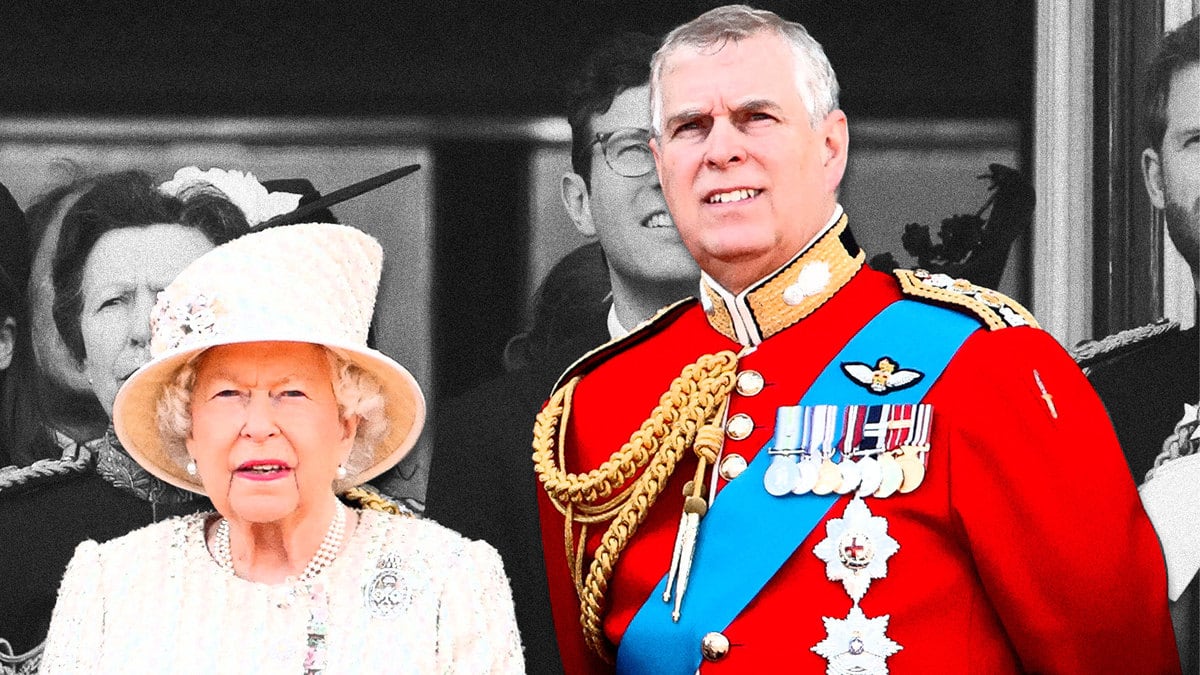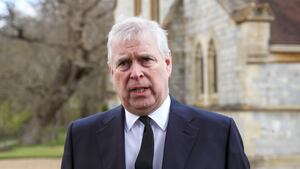For a graphic illustration of the extent and strength of the bond between Queen Elizabeth and her disgraced son Prince Andrew, it is instructive to look at his movements last week, when a civil lawsuit was filed by Virginia Roberts Giuffre, who alleged that she had been trafficked to and raped by Prince Andrew three times when she was 17.
Andrew bolted for Balmoral, the 1856 gothic fantasy of a castle in Scotland, where the queen traditionally retreats for the entire month of August (and a few weeks either side for good measure) to unwind.
Andrew’s flight to Scotland speaks eloquently to his mother’s indulgence of the man often described as her favorite son. Indeed, the queen went above and beyond the requirements of maternal duty, ordering her solicitors to warn British media outlets not to take or publish photos of any royals or their guests at the castle, as The Daily Beast exclusively revealed this week.
Sources at the palace argued the issuing of the letter was standard procedure for royal holidays, but one might in that case have expected it to have been sent when the queen arrived at Balmoral, several weeks ago. In fact, the warning was issued the day after the legal suit was filed and the same day that Andrew arrived, accompanied by his ex-wife, Sarah Ferguson, who still lives with him.
(Prince Philip was well known to be infuriated by Andrew and Fergie’s unconventional living arrangements, and refused to be in the same room as Ferguson. His passing has therefore strengthened Andrew’s position, and lengthened the amount of time he and Sarah might be expected to spend at Balmoral together.)
But what exactly explains the queen’s continuing devotion to her third child, despite the enormous damage he has wreaked on the reputation of the monarchy?
Nigel Cawthorne, a prolific writer who earlier this year penned a new biography of Prince Andrew, entitled Prince Andrew: The End of the Monarchy and Epstein, told The Daily Beast: “He is often described as her favorite child, and that really is the case. That is partly because of the very long interval—10 years—between Anne’s birth and Andrew’s. Earlier on in her reign the queen was entirely concerned with ascending the throne, but by the time she had him she was much more relaxed in the role and so she lavished attention on him.”

A young queen with newborn Prince Andrew in 1960.
AFP via GettyPenny Junor, who has written multiple royal biographies, concurred, telling The Daily Beast: “When the queen had her first two children she had a very fierce nanny called Helen Lightbody who terrified the queen. She was unbelievably busy, but also quite a nervous new mum, so she let the nanny deal with the children.
“But when the second batch of children (Andrew and Edward) were born, she was relaxed and in her stride professionally and much more confident as a mother. That is where it all comes from. Even today the queen’s relationship with Andrew is much more relaxed and easier than that with Charles. Charles puts her on a pedestal, Andrew has a more traditional filial relationship with her.”
The author Christopher Andersen said: “Almost from birth, the queen treated Charles as a little adult, but Andrew was a very different story. For the first time, she had the luxury to actually enjoy motherhood. She sat on the nursery floor and played with Andrew. She told him bedtime stories and taught him nursery rhymes. She went along when he was picked up at school and turned up for sports days and other school events—things she never did for Charles, or for Anne either.”
As Andrew grew older, he developed a reputation for arrogance, hijinks—and a complicated love life. His mother’s indulgence continued unabated. He was hailed as a hero when he served on the front line in the Falklands War, the 10-week 1982 campaign that saw Britain defeat the Argentines for control of the Falkand Islands. He had a perilous job flying decoy helicopters to draw the fire of Argentine Exocet missiles. He met his mother on the dockside with a rose clamped between his teeth on his safe return to the U.K.
The photograph of her grinning at her cheeky son is an image of relief that any parent can identify with.
As Andrew attempted to settle into civilian life, residing in a cramped one-bedroom apartment at the back of Buckingham Palace, he embarked on a string of love affairs that resulted in him being dubbed “Randy Andy” by the British press. The longest of these was with the American actress Koo Stark (whom he actually met first before going to the Falklands but only began dating after his return), but Andrew was forced by his family to break off the relationship in 1983 after images of her topless, taken from films she had worked on, were published by British newspapers.
The queen was inclined to put his philandering down to high jinks, and when he married Sarah Ferguson in 1986 her faith in Andrew seemed to have been justified.

Prince Andrew and Sarah Ferguson with their children in their first appearance together since the announcement of their separation, in 1992.
Thierry Salou/AFP via GettyAlthough the couple were to divorce 10 years later, the queen adores Andrew’s children, Beatrice and Eugenie. They are frequent guests for informal afternoon tea at Buckingham Palace, sources have told The Daily Beast, and the queen credits Andrew and Fergie for rearing them well despite the challenges in their personal lives as parents.
All of this goes some way to explaining the devotion she feels for her son. But Penny Junor suspects that the queen also blames herself—and tries to compensate—for some of the chaos in Andrew’s life: “She feels, like many working mothers, a bit guilty. I think there are moments where she feels that if he has gone off the rails or is arrogant or entitled, it is her fault. Margaret Thatcher felt guilty about her son Mark, who was arrogant and unpleasant, but she adored him. The queen in some way feels something similar.”

Prince Andrew presents Queen Elizabeth with a trophy after the her horse won The Gold Cup on Ladies' Day during Royal Ascot on June 20, 2013.
Paul Gilham/GettyThere is no doubt that the queen has taken many opportunities to show personal solidarity with her son in recent years: although he has been removed from public duties, stripped of a state income and even evicted from his office in Buckingham Palace, the queen has stood by him.
After Andrew’s Panorama interview aired, and he had stepped down from public duties, she was photographed riding with her son in Windsor Great Park. The following weekend she was pictured traveling to church with him, and now that the legal storm clouds are closing in again he has been welcomed to the protective fortress that is Balmoral.
“It is rather extraordinary that instead of facing the world he is hiding behind a sofa in Balmoral,” says Cawthorne, “In some ways it is laudable that the family has rallied around in his hour of need, but from the point of view of the victims of Epstein this must look like honor among thieves.”
Andersen says: “Andrew is well aware that he has cast a spell over this mother. He’s always shamelessly played Mummy like a fiddle, and she’s always been willing to be played. When the queen sees Andrew, she sees the adorable infant she held in her arms and the spirited little boy who delighted her with his harmless hijinks. But the hijinks ceased being harmless a long time ago.
“The queen has always been in a fog when it comes to Andrew, and there is no sign that fog is about to lift. Sadly, while she’s taken a fairly hands-on approach toward Megxit, the queen has given Andrew a pass when it comes to Epstein—a still-evolving scandal that has the potential to do irreparable harm to the monarchy.”
What can be said with some certainty is that other members of her family do not share the queen’s unconditional affection for Andrew. Prince Harry, for example, when asked about Andrew by two Russian hackers who were posing as Greta Thunberg and her dad, said: “Whatever he has done or hasn’t done is completely separate from me and my wife. We operate in a way of inclusivity, and we are focusing on community. And so we are completely separate from the majority of my family,” he said.
Andrew’s rivalry with Prince Charles, who was seeking to cut him out of the core royal family even before his links to the Epstein scandal emerged, is well documented.
Cawthorne explored a thesis in his book that their feud goes back to the death of Princess Diana. He said: “Andrew tried to push Charles out of the way during the Diana scandal. As Charles’ popularity plummeted, Andrew lobbied the palace to install him as a regent for William. That has created friction between them which persists to this day.”
All this leaves a significant problem for Andrew when his mother dies. One can’t imagine Charles inviting him up to Balmoral with Fergie and issuing missives to the press apparently designed to protect him from intrusion.
As Andersen says: “Once Charles is on the throne, I’m fairly certain Andrew will fade into the shadows completely. He’ll have no other choice.”







